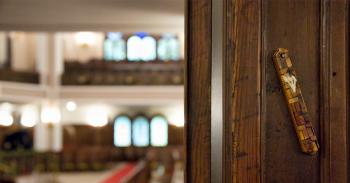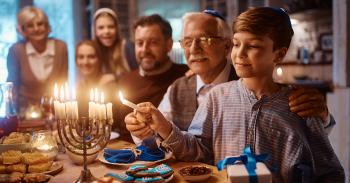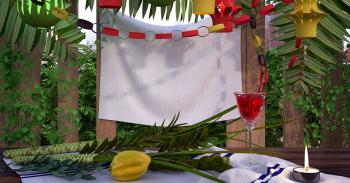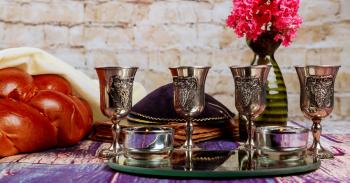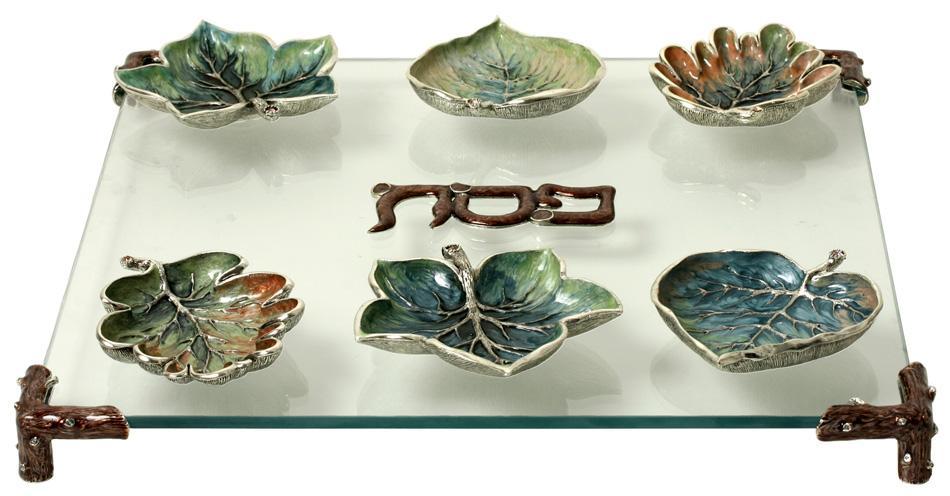
As we all know, Pesach (Passover) is a very special festival, not to mention a very busy time beforehand!
However, the height of Pesach are the Seder nights, and very exciting, especially for kids. We have Four Cups, a Seder plate, interesting stories, an Afikomen, and presents, not to mention a time when families get together, often with interesting guests.
If we look at the Four Cups, these are filled with wine or grape juice, and the cups used, silverware, plates etcetera are usually our best, making the evening even more special. Women go to great trouble to make this a very special occasion, as we all know. Since our usual silverware and suchlike have been used with Chamets, we buy new ones specially for Pesach, and set them aside during the year for Pesach.
We drink the first Cup when we make Kiddush, and the second just before the meal, after telling the story of how we were rescued from Egypt.
We drink the third Cup at the end of Grace after Meals, and fourth after Hallel, at the end of the Seder proper, before singing traditional Pesach Seder songs, usually old favorites.
Drinking each of these Cups is a Mitzvah in its own right, which is why we make a separate Brachah for each one. The Yerushalmi tells us that we drink Four Cups because the Torah (Exodus 6:6-7) tells us that, “I shall take you out from under the yoke of Egypt, I shall rescue you from their service, I shall redeem you with an outstretched arm and with great judgments. I shall take you to me for a people and I shall be a G-d unto you.” Each Cup represents one of these expressions, and it is customary to use beautiful cups for this occasion, often made of silver. For religious reasons, adults need to drink a large amount of wine for each Cup, just as we do for Kiddush during the year, health permitting. Generally, then, it is customary to use our best Kiddush cups for the Seder.
Having made Kiddush and drunk the first cup, though, we lift the Seder plate up and say, “Hah Lachmah Anyah”, telling everybody how Matza was the bread of affliction that our fathers ate in Egypt, and inviting whoever wants, to come and eat with us. Therefore, it is traditional to have guests for the Seders.
A Seder Plate usually has several sections or marked areas for several foods. These are the Zeroah, usually a chicken wing or leg, a burnt egg, Maror (bitter herbs), Charoset, a mixture of apples, nuts and wine, and Karpas, either celery, parsley or a boiled potato. (Customs for which foods to use vary from community to community). Again, people usually buy a beautiful Seder Plate for this special occasion.
Three Matzos are set out on the Seder table, and each Matza is separated and covered, one over the other. These represent, Cohen, Levy and Israel, with the Cohen at the top, and Levi in the middle. We often use special Matza covers for this purpose, usually very beautiful.
The middle Matza, “Levi”, is split in half, and the larger part becomes the Afikomen. This is traditionally “hidden” away, often in a special Afikomen bag. Kids look for it, and then hide it from whoever is making the Seder. When the time comes to eat the Afikomen, children demand and get presents from the person making the Seder, so that he can get his Afikomen back! This is part of kids’ Seder excitement. We also encourage them to ask questions throughout, and to sing and read along with us.
Not only do we drink all four Cups, but we also leave a large one out for Elijah, filled with wine. Leaving this cup out hints that we believe, just as G-d redeemed us from Egypt, that He will also redeem us in future, and send Elijah to give us the good news.
While the Four Cups refer to our redemption, so does Elijah’s Cup, and this is what Pesach is all about. Obviously, if this Cup is for Elijah, it has to be very special!
Let us honor G-d, celebrate our redemption from Egypt, and His saving us over generations, and pray for future Redemption as soon as possible.
In the meanwhile, let us prepare our homes and families for this joyous occasion, and honor Him as best we can, with a beautiful Seder.
Have a Kosher Pesach!
